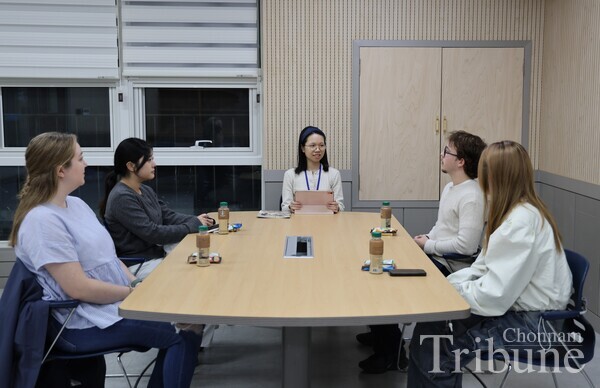
Work cultures reflect the social and economic history of a country as much as its individual styles and characteristics. Understanding each country’s unique culture is beneficial to the growth and success of international firms when entering the market. However, due to globalization and the increasing influence of millennials and Generation Z in the workplace, work cultures are shifting worldwide toward greater sustainability and work-life-balance. In this article the Chonnam Tribune explores perspectives of work cultures in different countries through the eyes of a multinational group of students at Chonnam National University.
Q. How is the working culture in your country?
Oh I-gippeum (South Korea): Korea’s work culture was largely shaped during the rapid economic growth period that began in the 1960s, referred to as “Miracle on the Han River.” At the time, productivity and efficiency were valued most. Hence, the older generations are used to long working hours and heavy workloads. Although this system contributed to the nation’s economic development, it often failed to guarantee employees have enough rest and sufficient quality of life. Today, there has been a growing demand for work-life balance and better welfare systems.
Ramsey Rachael Heather (USA): With the United States encompassing diverse industries and companies, work culture can vary widely. Generally, employees are expected to be hard-working and professional. Being prompt and efficient is expected. If an employee cannot complete their assigned work within the typical 9 a.m. to 5 p.m., 40-hour week, they might have to work overtime, especially in demanding sectors. Individualism is also emphasized. While employees, depending on position and organizational structure, are anticipated to work as a team, standing out individually is key to success and advancement.
Clément Jungmann (France): In France, the work culture is strongly focused on hierarchies where managers make decisions and communicate in a top-down structure. This structure defines career paths, as people often aim to climb the corporate ladder. Politeness is highly valued at work. Another vital aspect is the informal contexts, such as coffee break discussions. Though seemingly trivial, these breaks strengthen team cohesion and influence business decisions.
Q. How is the work-life balance culture formed in your society and how does it interact with demands for efficiency and work productivity?
Clément Jungmann: French people consider a good work-life balance to include earning enough to live comfortably, and young people expect to find meaning in their work as well. French employees are accustomed to having several weeks of holiday per year. Some companies have started testing the four-day week with promising productivity results. On average, a workday consists of 7 hours and 38 minutes of work and 51 minutes of breaks.
Ramsey Rachael Heather: Work-from-home positions have substantially increased since the COVID pandemic. Additionally, some companies offer alternative scheduling options, while most offerpaid time off (PTO) to better accommodate both workload and the employees' personal needs. PTO allows employees to take time away from work while still receiving their regular pay. Most countries offer 10 to 15 days of PTO annually in addition to federal and state holidays.
Q. How do employees in your country prioritize the "hustle" work culture?
Xiao Xuan (China): In China, there is a popular term called “9-9-6 work culture”, which means working from 9 a.m. to 9 p.m. for six days a week. People regard this work culture as an embodiment of dedication and ambition. This norm is common in the tech industry where employees have endless overtime and eventually lose their sense of self, leading to mechanical relationships. However, the culture is shifting from blind sacrifice to sustainable productivity. Even though overwork still exists, many companies are beginning to address employees’ well-being, enact flexible hours, and support workers' mental health.
Oh I-gippeum: Though controversial, the hustle work culture has several positive aspects. It encourages individuals to develop their skills and reach their full potential. Besides, it enhances productivity and gives employees a strong sense of accomplishment when they achieve their desired outcomes. To avoid employees’ mental burnout or health issues, companies should adopt flexible working hours and organize regular wellness activities. Employees also need to take care of their own well-being by setting realistic goals, avoiding overwork, keeping in personal hobbies, engaging in regular exercise, etc.
Work cultures have changed enormously over the past 30 years. As human beings have overcome unstable economic conditions and challenges since the 20th century, they have accumulated wealth and now prioritize well-being, including work-life balance and flexibility at work. In strict societies like developed Asian countries, which are well-known for long working hours and company loyalty, these traditions are slowly being altered. Young people are becoming a driving force behind these changes by prioritizing work-life balance. Technology, automation, and the gig economy are reshaping how people work, while governments and companies are taking stronger action against overwork and inequality. The modern workplace is becoming more fluid and inclusive — a reflection of how humanity continues to adapt its way of working to evolving values.
---------------------------------------
Oh I-gippeum: Sophomore, Department of English Language and Literature, South Korea
Xiao Xuan: Exchange Student, Department of Asian Culture, China
Clément Jungmann: Exchange Student, Department of Business Administration, France
Ramsey Rachael Heather: Master’s Student, Interdisciplinary Program of Perfume and Cosmetics, USA
By Hoang Thi Le Tra, Editor
